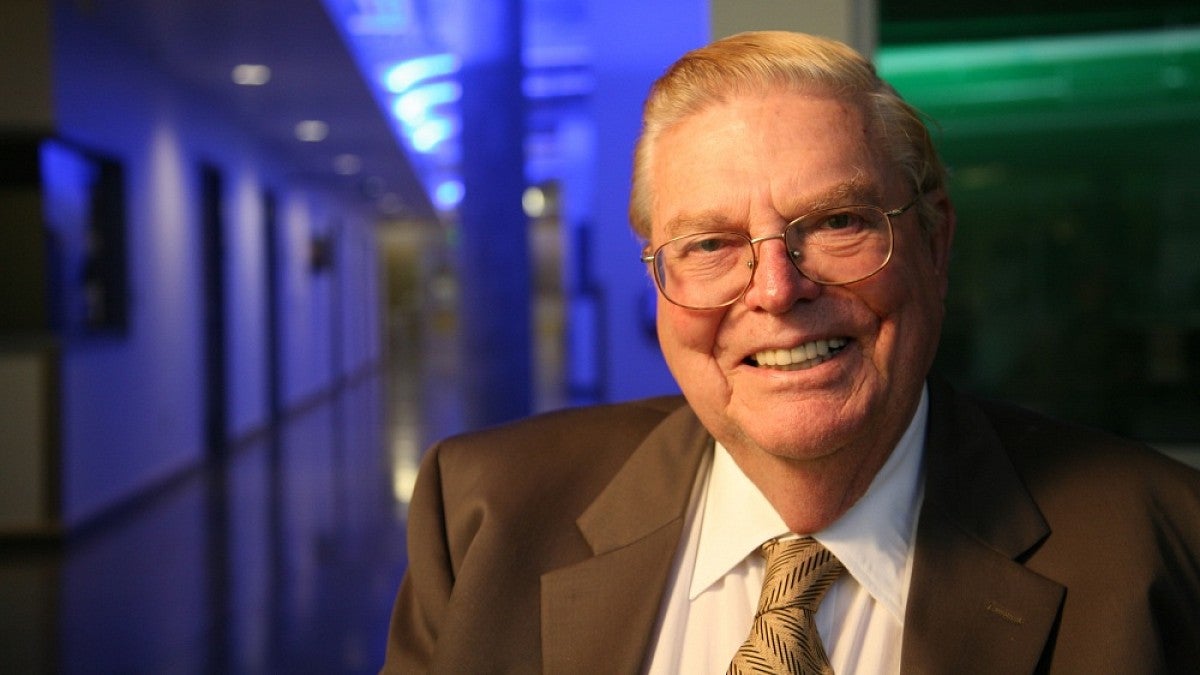The man who saw the possibilities to “fill holes in the ground” with state-of-the-art laboratories on the east side of the University of Oregon campus now has a vision for attracting the right people to power the UO’s newest science initiative.
UO benefactor Lorry I. Lokey says that $10 million will get the ball rolling to endow up to five faculty positions for the upcoming Phil and Penny Knight Campus for Accelerating Scientific Impact, and he hopes to inspire others to make similar gifts.
“The future is science, and it’s imperative that the UO builds for it,” Lokey said. “Phil Knight has put his generous gift of $500 million on the line to get it going. It’s mandatory that the rest of us chip in to assure its success and make the UO a West Coast center for science education, research and development.”
“Lorry Lokey never ceases to amaze us,” UO President Michael Schill said. “His vision to create support for these new endowed faculty positions is absolutely essential to our success and will help us attract outstanding researchers to our campus. These are the types of superstar faculty that will personify the Knight Campus.”
Lokey expressed his intent to lead the charge for new professors following the March 2 groundbreaking for the Knight Campus, a $1 billion project designed to fast-track scientific discoveries into treatments, therapies and technologies that can radically improve human health. The campus was launched in October 2016 with a $500 million gift from Nike founder Phil Knight and his wife, Penny.
Lokey’s earlier lead gifts for new construction were the engine behind the UO’s transformative build-out of research facilities from 2004 to 2008. The university named its group of science buildings the Lorry I. Lokey Science Complex in appreciation for his additional $74.6 million gift to advance teaching and research in several fields, notably neuroscience and materials science.
In the underground core of the complex, the Lorry I. Lokey Laboratories host super-advanced equipment used by teams of researchers across disciplines. This philosophy of sharing high-cost research instruments among scientists in collaborative fields is also the model for the new Knight Campus, which will connect to the Lokey Science Complex via a sky bridge spanning Franklin Boulevard.
“The Knight Campus is a huge extension of what I started in the existing science center,” Lokey said. “Oregon is on a wonderful run that began in Dave Frohnmayer’s time and now continues with President Schill. Donors should consider supporting the Knight Campus because it is a tremendous investment in the future.”
While completion of the first phase of the Knight Campus is two years away, now’s the time to plan strategic hires, said Patrick Phillips, the acting executive director.
“We’re recruiting people with extraordinary accomplishments in their own fields, and who are aligned with the UO’s tradition of interdisciplinary collaboration and entrepreneurship,” Phillips said. “That will be the defining culture.”
Private gifts are essential, Phillips said, because the Knight Campus will require many new faculty positions beyond those in existing departments and research centers. Endowed chairs serve as magnets to attract top faculty because they provide stable, ongoing funding for salary, research, graduate assistants and other resources.
“Faculty members are the life blood of a university,” Lokey echoed. “Buildings are the body. If you don’t have great faculty, then great buildings mean nothing. A university’s greatest asset is its faculty.”
An Oregon native, Lokey graduated from Stanford University, where he is also a major donor. A journalism entrepreneur, he founded the Business Wire news service and built it into a fortune. He has since enjoyed a second career as a philanthropist, having given nearly $800 million to schools and colleges in the U.S. and Israel.
Ensuring long-term impact guides Lokey’s philanthropy. At the UO, he has invested nearly $140 million to support research and teaching. In addition to innovative science facilities, he has helped build the UO’s award-winning science library, expansions at the music school and the College of Education, and the journalism school’s Turnbull Center in Portland.
“I give where I can pour in dollars in a big way and make things happen,” he has said. "I invest in people.”


